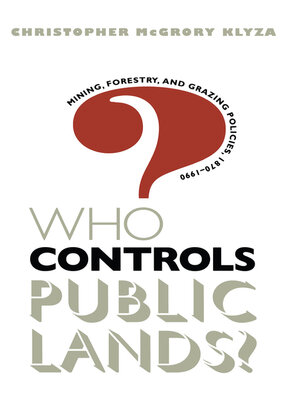Who Controls Public Lands?
ebook ∣ Mining, Forestry, and Grazing Policies, 1870-1990
By Christopher McGrory Klyza

Sign up to save your library
With an OverDrive account, you can save your favorite libraries for at-a-glance information about availability. Find out more about OverDrive accounts.
Find this title in Libby, the library reading app by OverDrive.



Search for a digital library with this title
Title found at these libraries:
| Library Name | Distance |
|---|---|
| Loading... |
In this historical and comparative study, Christopher McGrory Klyza explores why land-management policies in mining, forestry, and grazing have followed different paths and explains why public-lands policy in general has remained virtually static over time. According to Klyza, understanding the different philosophies that gave rise to each policy regime is crucial to reforming public-lands policy in the future. Klyza begins by delineating how prevailing policy philosophies over the course of the last century have shaped each of the three land-use patterns he discusses. In mining, the model was economic liberalism, which mandated privatization of public lands; in forestry, it was technocratic utilitarianism, which called for government ownership and management of land; and in grazing, it was interest-group liberalism, in which private interests determined government policy. Each of these philosophies held sway in the years during which policy for that particular resource was formed, says Klyza, and continues to animate it even today.







